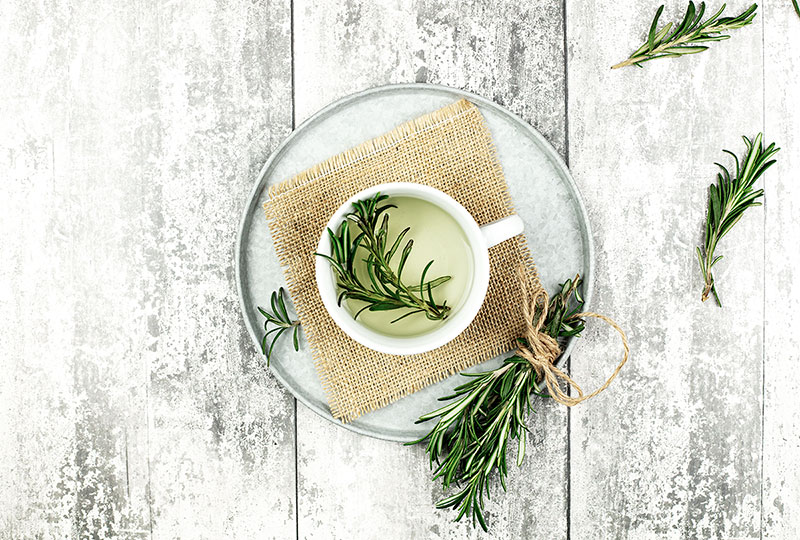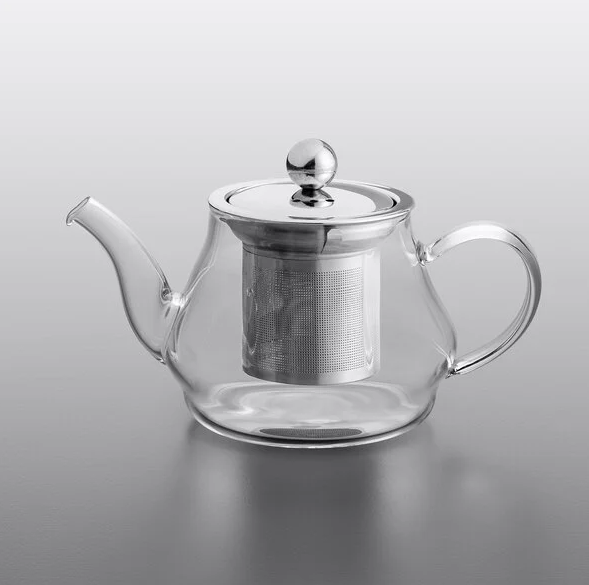Rosemary Tea Guide
When all you need is a cup of soothing and aromatic tea, nothing can beat rosemary. This culinary herb has a unique and very recognizable scent and flavor, and may provide many potential health benefits. Learn what is rosemary tea and how to make it at home.
 Rosemary tea with fresh rosemary sprigs
Rosemary tea with fresh rosemary sprigs
[1] https://www.sciencedirect.com/science/article/pii/S0031942214005585 [2] https://www.ncbi.nlm.nih.gov/pmc/articles/PMC6165352/ [3] https://www.flushinghospital.org/newsletter/the-health-benefits-of-rosemary/ [4] https://www.ncbi.nlm.nih.gov/pmc/articles/PMC4227022/ [5] https://www.researchgate.net/figure/Effects-of-rosemary-extract-RE-standardised-to-20-carnosic-acid-on-body-weight-after_fig1_51222043 [6] https://www.researchgate.net/figure/Effects-of-rosemary-extract-RE-standardised-to-20-carnosic-acid-on-body-weight-after_fig1_51222043 [7] https://www.sciencedirect.com/science/article/pii/S2314808X16301890 [8] https://www.ncbi.nlm.nih.gov/pmc/articles/PMC4749867/ [9] https://www.researchgate.net/publication/275411661_Rosemary_tea_consumption_results_to_anxiolytic-_and_anti-depressant-like_behavior_of_adult_male_mice_and_inhibits_all_cerebral_area_and_liver_cholinesterase_activity_Phytochemical_investigation_and_in [10] https://www.hindawi.com/journals/ecam/2016/2680409/ [11] https://www.researchgate.net/publication/339771173_PROTECTIVE_EFFECT_OF_ROSEMARY_ON_LIVER_CIRRHOSIS_INDUCED_EXPERIMENTALLY_IN_RATS [12] https://www.ncbi.nlm.nih.gov/pmc/articles/PMC6325740/ [13] https://www.ncbi.nlm.nih.gov/pmc/articles/PMC7352773/
What is rosemary tea?
Rosemary tea is a herbal tea made by steeping rosemary leaves in hot water. Rosemary, Rosmarinus officinalis or Salvia Rosmarinus is a very fragrant and aromatic evergreen bush native to Mediterranean countries. There are many types of rosemary and you can use any of them for making tea. Some will be more aromatic than the others. Rosemary tea can sometimes be bitter, depending on which rosemary type you use and how you brew it. If your homemade rosemary tea taste bitter, reduce steeping time or add honey and lemon to enhance the flavor.Tea Origins
If you ever had a holiday along the Mediterranean coast, you may have seen rosemary bushes growing everywhere. They thrive in dried climates with a lot of sunshine. Rosemary is very important in Mediterranean cuisine, especially for adding flavor to fish dishes. Tea, although not as popular as some other herbal teas, may offer wonderful health benefits along with unique and soothing flavor. Another common use of rosemary leaves is for making rosemary essential oils popular in aromatherapy. Rosemary essential oil is often used for promoting hair growth and relaxation.Tea Taste
Although rosemary has a very intense scent, rosemary tea, when brewed properly, is incredibly refreshing and light. The flavor of this pungent herb is not easy to describe. It’s an intense mix of woody, piney, peppery and fresh note. Rosemary tea with fresh rosemary sprigs
Rosemary tea with fresh rosemary sprigs
Health Benefits of Drinking Rosemary tea
Drinking rosemary tea may provide many health benefits. The main antioxidants in rosemary are carnosol and carnosic acid that may provide antioxidant and antimicrobial activity[1]. Because of its strong antimicrobial and antioxidant properties, rosemary is even used in food preservation[2]. Excessive intake of rosemary may cause side effects such as vomiting or spasms[3]. Health benefits of rosemary include:1. Antioxidant activity
Studies suggest that rosemary has a very potent antioxidant and free radical scavenging activity. It may help protect the liver from oxidative stress and may even be used in food industry as a preservative[4].2. Aiding weight loss
Studies suggest that carnosic acid may have a potential effect on weight loss too[5]. It may help control levels of bad cholesterol and may provide a help lower blood sugar levels too[6].3. Brain health
Traditionally, rosemary tea and rosemary oil is used for easing stress and relaxation, but it may impact the brain in other ways too. Studies suggest that rosemary essential oil may help significantly improve short-term memory[7], and may be very beneficial for people with Alzheimer’s disease[8]. Rosemary tea may provide anxiolytic and antidepressant effect too, which makes a cup of rosemary tea perfect to end a stressful day[9].4. Anti inflammatory activity
Rosemary may have a very potent anti inflammatory activity. Studies showed it may, among others, be especially helpful with different types of brain inflammation[10] and chronic liver diseases[11]. It may also help reduce the pain related to inflammation[12].5. Anticancer activity
Rosemary may provide the anticancer activity too. So far studies showed that rosemary may have an effect on colon cancer, lung cancer, hepatocellular carcinoma, skin cancer, oral cancer, prostate cancer and breast cancer[13].Caffeine Content
Pure rosemary tea made with only hot water and rosemary leaves is naturally caffeine free. However, some Camellia sinensis tea blends may contain rosemary too. If your tea blend contains real tea, then it’s likely it will contain caffeine. For example, Rose Grey black tea with bergamot, rose, lavender and rosemary will contain a high amount of caffeine.How to Brew Rosemary Tea
You can make rosemary tea using pre-made rosemary blends, dried and chopped rosemary leaves or fresh rosemary twigs. If you want a fresher flavor, fresh rosemary twigs are a better option. Use about 2 twigs per cup of water. Wash them in cold water before use. Bring fresh spring water to a boil. Put two fresh rosemary twigs in a cup and add water. Steep for 5 minutes in boiling water. Remove the twigs from a cup and drink. If you want to intensify the rosemary aroma, the best way to sweeten your tea is with a teaspoon of rosemary honey. A few drops of freshly squeezed lemon juice will add a light and zesty note. For a refreshing light drink, you can try cold brewing rosemary twigs in the fridge. Try adding a few other ingredients, such as rose petals, lavender, mint or sliced lemon.Where to Buy
Today, rosemary is widely available in many supermarkets around the world. This indispensable culinary herb can be grown at home too. It will grow both indoors and outdoors, and some types may even survive harsh winters. You can buy rosemary twigs too, or dried and chopped rosemary twigs that can be used both for cooking and making tea.Disclaimer: This article is for informational purposes only. It’s not intended to replace medical advice, diagnosis or treatment. Every person is different and may react to different herbs and teas differently. Never use teas or herbs to treat serious medical conditions on your own. Always seek professional medical advice before choosing home remedies.
References
[1] https://www.sciencedirect.com/science/article/pii/S0031942214005585 [2] https://www.ncbi.nlm.nih.gov/pmc/articles/PMC6165352/ [3] https://www.flushinghospital.org/newsletter/the-health-benefits-of-rosemary/ [4] https://www.ncbi.nlm.nih.gov/pmc/articles/PMC4227022/ [5] https://www.researchgate.net/figure/Effects-of-rosemary-extract-RE-standardised-to-20-carnosic-acid-on-body-weight-after_fig1_51222043 [6] https://www.researchgate.net/figure/Effects-of-rosemary-extract-RE-standardised-to-20-carnosic-acid-on-body-weight-after_fig1_51222043 [7] https://www.sciencedirect.com/science/article/pii/S2314808X16301890 [8] https://www.ncbi.nlm.nih.gov/pmc/articles/PMC4749867/ [9] https://www.researchgate.net/publication/275411661_Rosemary_tea_consumption_results_to_anxiolytic-_and_anti-depressant-like_behavior_of_adult_male_mice_and_inhibits_all_cerebral_area_and_liver_cholinesterase_activity_Phytochemical_investigation_and_in [10] https://www.hindawi.com/journals/ecam/2016/2680409/ [11] https://www.researchgate.net/publication/339771173_PROTECTIVE_EFFECT_OF_ROSEMARY_ON_LIVER_CIRRHOSIS_INDUCED_EXPERIMENTALLY_IN_RATS [12] https://www.ncbi.nlm.nih.gov/pmc/articles/PMC6325740/ [13] https://www.ncbi.nlm.nih.gov/pmc/articles/PMC7352773/
More from:
SLL




Leave a comment